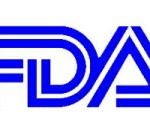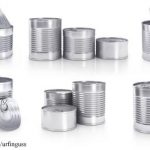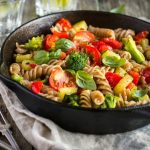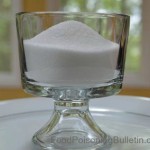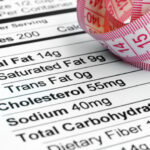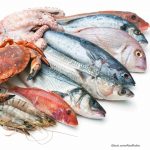Today, the FDA finalized its determination that trans fats, made from partially hydrogenated oils (PHOs), are not "generally recognized as safe" or GRAS, for use in human food. Food manufacturers will have three years to remove this ingredient from products. FDA's Acting Commissioner Stephen Ostroff said in a statement, "the FDA's action on this major source of artificial trans fats demonstrates the agency's commitment to the heart health of all Americans. This action is expected to reduce coronary heart disease and prevent thousands of fatal heart attacks every year." Since 2006, food manufacturers have been required to include trans fat content information on nutrition labels on all food products. But manufacturers could put "0 grams trans fat" on the label if the product contained … [Read more...]
Spending Bill Cuts $93 Million from WIC
The huge spending bill passed by Congress last week cuts $93,000,000 from the Women Infants and Children (WIC) Supplemental Nutrition Assistance Program (SNAP). That program gives low-income mothers and children vouchers for food that meets nutrition guidelines. WIC has been one of the most successful government programs in history. Both WIC and SNAP add money to local economies. In fact, every five dollars in SNAP benefits generates nine dollars in community spending. And the food purchased by SNAP recipients generates 3,000 farm jobs. In addition, every study shows that WIC improves birth outcomes. Almost half of the participants in SNAP are children. Legislators did require the WIC program to add white potatoes to the foods on the allowed list, pandering to industry lobbyists. … [Read more...]
Does BPA Exposure Increase Blood Pressure?
A new study claims that exposure to Bisphenol A (BPA) from drinking canned beverages increases blood pressure. BPA is a chemical used to line metal cans and make plastic bottles. It has been associated with hypertension in earlier studies. This new study was a randomized crossover trial with adults age 60 hayers and older. The participants were given the same beverage in 2 glass bottles, 2 cans, or 1 can and 1 glass bottle at a time. Urinary BPA concentration, blood pressure, and heart rate variability were measured 2 hours after each beverage was consumed. Each participant visited the study site three times. Urinary BPA concentration increased after consuming canned beverages by more than 1600% compared to the concentration after drinking beverages from glass containers. Systolic … [Read more...]
Groups Say Balanced Diet is Healthiest
Eighteen organizations have joined forces to promote a balanced diet as the healthiest for consumers. The collaboration is called "Back to Balance Coalition", which supports a "balanced, practical and achievable dietary guidance." The group has a new website. Their philosophy is that empowering choice is more effective than restricting it, and that Dietary Guidelines should be practical, affordable, and achievable. They say that restricting food choices by classifying foods as "good" or "bad may create unhealthy behaviors. Recommendations should stress the "traditional core principles of dietary guidelines: balance, variety, and moderation." Polling data shows that dietitians and other health professionals prefer balanced information instead of prescriptive food policies. The survey, … [Read more...]
CSPI, Others Target Junk Food Marketing to Children
Center for Science in the Public Interest, along with MomsRising.org, the American Heart Association, and Prevention Institute are asking candy companies to stop marketing unhealthy foods to kids. Hershey, Mars, and Nestle belong to the Children's Food and Beverage Advertising Initiative (CFBAI), but Tootsie Roll, the American Licorice Company, Haribo of America, Perfetti Van Melle, and The Topps Company do not participate in that program. CFBAI participants are trying to change the children's food advertising landscape. Participants pledge to only advertise foods meeting "meaningful nutrition criteria" or to not advertise to children. They also agree to be held accountable by CFBAI for their actions. CSPI says that Haribo and Tootsie Roll Industries do not have any publicly … [Read more...]
Study Finds Consumers Think Added Sugar Labels Helpful
A study published in the December issue of the journal Obesity has found that consumers think more information about added sugars on nutrition labels will be helpful. Food manufacturers believe that more information would simply confuse consumers. The study looked at 500 U.S. adults in a voluntary online survey. Most consumers, or 63%, said that knowing how much added sugar was in a food product (as opposed to naturally occurring sugar) would be helpful. Just 18% of respondents thought that adding this information would be confusing, but most of those people gave reasons "that suggest they were indifferent to the information," according to the researchers. Those reasons included "I don't know" and "I don't care." FDA wants to declare added sugar on food labels and has proposed a … [Read more...]
Trans Fat Consumption is Linked to Diminished Memory
According to a study by the American Heart Association, trans fat consumption is linked to diminished memory in working-aged men. The American Heart Association Meeting Report Abstract 15572 states that in a study of about 1,000 healthy men, those who consumed the most trans fats showed "notably worse performance on a word memory test." The strength of this association remained even after the study results were adjusted for age, education, ethnicity, and depression. Dr. Beatrice A. Golomb, lead author of the study and professor of medicine at the University of California-San Diego said in a statement, "Trans fats were most strongly linked to worse memory, in young and middle-aged men, during their working and career-building years. From a health standpoint, trans fat consumption has … [Read more...]
FDA Finalizes Menu Labeling for Restaurants and Vending Machines
The FDA has finalized two rules requiring calorie information on menus and menu boards in retail food establishments, including chain restaurants, and vending machines with 20 or more locations. FDA Commissioner Margaret Hamburg told reporters "Strikingly, Americans eat and drink about a third of their calories away from home - often consuming less nutritious foods and also underestimating the calories that they eat. These final rules will give consumers more information when they are dining out and help them lead healthier lives." Labeling foods is critical to help consumers make healthy food choices. These new rules provide a consistent standard across the country and may help reduce consumer confusion about this issue. The proposed rules were released in 2011. The menu labeling … [Read more...]
CSPI Files Objection to Vitaminwater Lawsuit Settlement
An agreement to settle a class action lawsuit against Coca-Cola over its marketing of Vitaminwater would not stop deceptive marketing of the products or give consumers any relief, according to an objection filed by the Center for Science in the Public Interest. CSPI sued Coca-Cola in a California federal court in 2009 citing deceptive and unsubstantiated claims marketing Vitaminwater as being healthier than soda. Coca-Cola has used words such as "defense", "rescue", "energy", and "endurance" to describe the product. Labels on the product also make claims stating that the products promote healthy joints, reduce the risk of eye disease, and other health benefits. The product contains no more than 1% juice, but references blueberry, strawberry, kiwi, peach, mango, and other fruits on the … [Read more...]
Environmental Working Group Releases Seafood Guide
Environmental Working Group has released a "Good Seafood Guide" that helps consumers consume fish and shellfish that are high in Omega-3 fatty acids, low in mercury, and harvested from sustainable sources. The agency offers a calculator, a guide to seafood, and an FAQ on how much seafood people should eat. The calculator lets you input weight, age, gender, pregnancy status, and heart disease condition. A personalized list of which fish to eat will be generated which includes more than 80 species. The seafood is divided into five categories: Best Bets, which include wild salmon and sardines; Good Choices, which include Oysters and Pollock; Low Mercury but Low Omega-3s, which include Shrimp, Tilapia, and Scallops; Mercury Risks Add Up, which include Halibut and Lobster; and Avoid, which … [Read more...]
